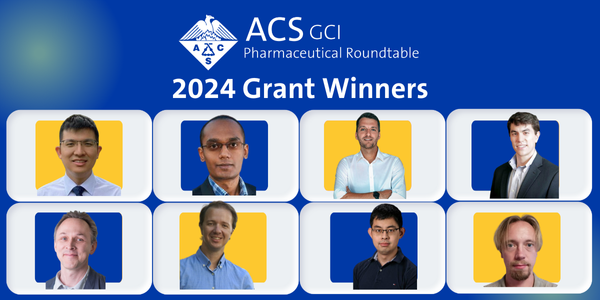This article originally appeared in The Nexus newsletter and blog.
By Vittoria Valentine, ACS GCI Industry Portfolio Administrative Assistant

Eight researchers from the United States, Canada, and Europe have been awarded research grant funding totaling $480,000 from the ACS Green Chemistry Institute Pharmaceutical Roundtable (GCIPR). The ACS GCI Pharmaceutical Roundtable identifies key challenges in synthetic chemistry and process research that can enhance pharmaceutical development and production.
Key Research Area Grants
Four key research areas were selected for funding by the GCIPR in 2024. These targeted research grant winners are awarded $80,000 for a 12-month research commitment.
1. Data Science and Modeling Tools to Advance Green Chemistry & Engineering
This grant funds work towards developing computational tools that empower users to effectively design, implement, and evaluate green processes with reduced process mass intensity, waste, health and safety impact, and other aspirational improvements. This year’s grant was awarded to Dr. Karthik Sankaranarayanan assistant professor of agriculture and biological engineering at Purdue University, for his proposal, “Computational planning of enzyme-catalyzed routes for green manufacturing of small molecules.” Dr. Sankaranarayanan aims to develop computer-aided synthesis planning tools that will propose experimentally testable biocatalytic routes with minimal expert intervention while considering process constraints and reaction feasibility.
2. Alternatives to Halogenated Solvents in Organic Synthesis
This grant aims to develop practical alternatives to halogenated solvents. Dr. Reid Van Lehn Hunt-Hougen Associate Professor in the Department of Chemical and Biological Engineering and associate professor in the Department of Chemistry of the University of Wisconsin, Madison, was awarded this grant for his proposal, “Data-Driven replacement of halogenated solvents by green solvent mixtures.” Dr. Van Lehn plans to develop machine learning software that considers the physical properties of green solvent mixtures and then identifies halogenated solvents with similar thermodynamic properties for the mixture to replace. They will investigate the solvent-solute interactions in suitable mixtures and compare them with behaviors in corresponding halogenated solvents to better understand the basis for solvent replacement.
3. New Methods or Strategies for Greener Peptide Synthesis and/or Purification
This grant aims to develop novel methods and strategies for improved solid-phase peptide synthesis.Dr. Jeffery Bode, professor of organic chemistry from the Federal Institute of Technology, Zurich was awarded this grant for his proposal, “Synthesis of incretins by coupling of C-terminally modified recombinant peptides.” Dr. Bode’s objective is to interface new chemoselective amide-forming couplings and the recombinant production of C-terminally modified peptides for the semi-synthetic preparation of incretins. This project will focus on the semi-synthetic production of tirzepatide using KAHA ligation.
4. Sustainable Oligonucleotides Process Development
This grant aims to support new technologies and/or the optimization of existing methods to address the environmental challenges facing the current process of oligonucleotide manufacturing. This grant was awarded to Dr. Andreas Dahlin professor of applied chemistry at Chalmers University of Technology in Gothenburg, Sweden, for his proposal, “Purification of oligonucleotides and peptides using polymer brushes.” Dr. Dahlin will use polymer brushes for the capture and release of oligonucleotides by electrostatic interactions that are sensitive to pH. This work would expand polymer brush purification technologies, which have had success with proteins, to new applications with oligonucleotide purification. The use of polymer brush purification in place of traditional techniques reduces the environmental impact of biopharmaceutical purification.
__________
Ignition Grants
The Ignition Grant Program supports high-risk, high-reward projects over a six-month period. This grant program aims to accelerate progress in green chemistry technologies by incentivizing innovation. Ignition grants provide recipients with $40,000 over six months.
This year, the ACS GCIPR awarded four Ignition grants to winners across the Americas and Europe.
Dr. Liang Feng, assistant professor in the Thomas Lord Department of Mechanical Engineering and Materials Science at Duke University, received a grant for his proposal, “Electrochemically driven pumping for greener sequence-controlled peptide synthesis.” Dr. Feng seeks to develop molecular pumps that synthesize oligopeptides by replicating natural ribosomes' intricate synthesis and high-fidelity mechanisms. This method eliminates the need for protective group strategies, drastically reducing solvent use.
Dr. Bart Pieber, assistant professor of chemistry at the Institute of Science and Technology, Austria, received a grant for his proposal, “Iron-catalyzed carbon-carbon cross-couplings triggered by visible-light.” Dr. Pieber aims to achieve additive-free, light-mediated, iron-catalyzed C–C cross-couplings between aryl halides and organoboron substrates. This project aims to progress homogenous Fe catalysis techniques, allowing cross-coupling technologies to use safer, more abundant, and more affordable metal catalysts.
Dr. Yang Hai, assistant professor in the Department of Chemistry and Biochemistry at the University of California, Santa Barbara, received a grant for his proposal, “Developing a general biocatalytic platform for stereodivergent enantioselective synthesis of alpha-amino acids via enzymatic decarboxylation of aminomalonic acids.” The goal of this project is to develop a general biocatalytic platform for stereodivergent synthesis of both L- and D-amino acids through enzymatic decarboxylative protonation of aminomalonic acids. This technology would provide a much more efficient and sustainable solution to the challenge of D-amino acid synthesis.
Dr. Lucas Caire da Silva, assistant professor of chemistry at McGill University received a grant for his proposal, “Coacervate microreactors for Ni-catalyzed cross-coupling reactions in water.” Dr. Caire da Silva anticipates that encapsulating nickel (Ni) catalysts in hydrophobic, "enzyme-like" microenvironments formed by peptide coacervates will stabilize and protect the catalysts, enabling cross-coupling reactions in water. These coacervates are developed from simple, biodegradable, and biocompatible short peptides. By modifying the peptide structure, it may be possible to optimize the microenvironment for other catalysts, thereby creating new opportunities for the development of integrated catalytic systems in aqueous environments.
Join us in congratulating the 2024 grant winners! Requests for proposals on new research topics are issued each March. Since launching its grant program in 2007, the GCIPR has invested over $3.5 million in research. For more information, see: https://www.acsgcipr.org/grants/
